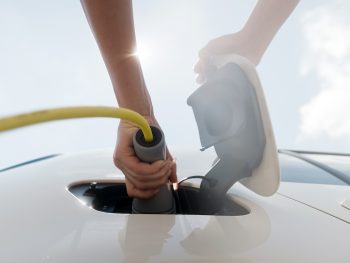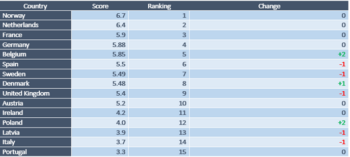Government needs to ‘step up support for EVs’ to stop falling behind in transition
The Government is being urged to step up the pace with crucial electric vehicle support programmes amid a warning that it’s dropping behind much of Europe in the race to grow EV fleets.

Cornwall Insight is calling for a more consistent and holistic approach to EV support
Data analysed for Cornwall Insight and law firm Shoosmiths’ Electric Vehicle Country Attractiveness (EVCA) Index reveals that the UK’s battery electric vehicle (BEV) fleet experienced a slower growth of 37% in the past year, down from 42% the previous year.
The firms say this places the nation significantly behind many others on the Index, especially when considering the EU’s average growth of 48% over the same period.
Setbacks in crucial support programmes such as the Rapid Charging Fund, cuts to electric vehicle passenger car purchase incentives for most consumers, and the rollback of the 2030 ICE ban have seen the UK drop behind much of Europe in the race to grow EV fleets.
The results are all the more concerning with the looming threat of new trade tariffs, threatening to further discourage investment and slow down the transition to EVs. Due to take effect from 1 January 2024, the Rules of Origin tariffs could add on approximately £3,400 to EU-made EVs sold in the UK and £3,600 to British-made EVs sold in Europe.
Discussions continue around potential delays to the implementation of the tariffs, with the UK proposing a delay until 2027. When these tariffs are implemented, the cost-gap between EVs and more polluting vehicles could widen by a significant amount, as petrol and diesel vehicles will be unaffected.
It’s hoped that recent government announcements – including the work to accelerate grid connections announced in the Autumn Statement – could help to speed up growth as, alongside the £2bn for zero emission advanced automotive manufacturing and the new battery strategy, the Government is aiming to remove “unnecessary planning constraints” and ensure that the National Planning Policy Framework “prioritises the rollout of EV charge points”.
However, whenever the planned Rules of Origin tariff is implemented, Cornwall Insight says EV sales in the UK are almost certain to be negatively impacted.

EVCA Index scores and rankings
Comparatively slow growth, a roll back in petrol and diesel phase-out targets, and a lack of urgency in delivering publicly accessible charge-points have all seen the UK’s attractiveness for investment in EVs wane, with the UK dropping to 9th out of 15 major European nations in the EVCA Index.
And while latest UK new car registration figures show soaring EV uptake by fleets, they also reveal that uptake of BEVs fell by 17.1% in November, leading to a reduced market share of 15.6%, compared to 20.6% last year.
Jamie Maule, research analyst at Cornwall Insight, commented: “The Government needs to implement a more consistent and holistic approach to EV support, to avoid casting a shadow over the nation’s EV industry. While EV sales continue to rise at a respectable rate, the Government’s wavering commitment has created an unstable environment for investors, potentially jeopardising the development of a robust domestic supply chain and exposing potential buyers to higher costs.
“The Autumn Statement’s pledge of financial and policy support offers some hope. However, if the UK is to establish itself as a true leader in EV growth, we will need to see both sustained government funding and the cultivation of a fully supportive regulatory framework.
“The introduction of tariffs for EVs made outside the EU would add another entry into the ‘cons’ column for investors looking at sites in the UK, and would push up prices for UK drivers buying EVs from Europe. Question marks remain over whether the EU will agree to the three-year delay being touted by the UK. Without it, the UK’s EV transition faces a tougher road ahead.”
Chris Pritchett, energy and infrastructure partner at Shoosmiths, added: “Policy and economic uncertainty remain a major obstacle to accelerating EV readiness, as stuttering deployment of the Rapid Charging Fund and the threat of the Rules of Origin tariffs in the UK could put the brakes on the attractiveness of new EVs.
“We are encouraged, though, by positive aspects of the Autumn Statement to support UK battery manufacturing, actions on grid connections and planning but more importantly, the significant scale of EV infrastructure and energy projects our industry partners are preparing to deliver across the UK and Europe.
“Alongside this, the increasing availability of second-hand and ex-fleet EVs will significantly increase the accessibility of EVs, as well as significant players such as Motability bringing EVs to a much wider range of customers and geographies. We remain very positive.”












